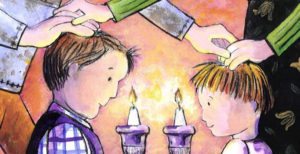 My husband blesses our children on Friday night when we sit down to Shabbat dinner. If he is detained at the hospital and we bring in Shabbat without him, I make Kiddush and I make Ha-Motzi on the challah. But I don’t bless my daughters. I leave that for when he makes it home.
My husband blesses our children on Friday night when we sit down to Shabbat dinner. If he is detained at the hospital and we bring in Shabbat without him, I make Kiddush and I make Ha-Motzi on the challah. But I don’t bless my daughters. I leave that for when he makes it home.
I’m not sure why. There’s no reason why I can’t. There’s no reason why we both can’t bless them, either together or separately. But somehow I always felt that this was infringing on or usurping something special he bestowed upon them, and something my girls connected with their father.
In this week’s parashat Naso, we find the priestly blessing recited in synagogue services.
Speak to Aaron and to his sons, saying so shall you bless the Children of Israel, say to them: May the Lord bless you and keep you; May the Lord shine His countenance upon you and may He be gracious to you; May the Lord lift His countenance to you and bring you peace. They shall place My name upon the Children of Israel and I shall bless them.
The blessing has an interesting structure with each line increasing in number of Hebrew words (3, 5 and 7) and progressing in significance. Many commentators explained that the first blessing – May the Lord bless you and keep you – refers to material goods and possessions. The second blessing – May the Lord shine His countenance upon you and may He be gracious to you – refers to spiritual blessing and perhaps enlightenment from Torah. And the third blessing – May the Lord lift His countenance to you and bring you peace – refers to when we have attained a closeness to God in our service and worship of Him that we are no longer seeking material or spiritual gains.
After God commands Aaron and his sons to bless the people with this blessing, He says of the priests: They shall place My name upon the Children of Israel and I shall bless them.
Who is God blessing? Is He blessing the priests for blessing the Israelites? Or is He blessing the Israelites because the priests place My name upon them – according to God’s command? In which case, why do we need the priestly intermediary? Why can’t God bless the Israelites directly?
Rashi offers two explanations. First he says the phrase refers to the Israelites – that God will agree with the priestly blessing of the Israelites and bless them. Then he says, “Alternatively, and I shall bless them means God will bless the priests.”
Rashi’s grandson, Rashbam, explains that the priests were commanded to invoke a divine blessing on the people not to bless them as one person blesses another, and God promised to respond to this type of prayer for their well-being.
Neither commentator suggested that the priests were allocated any special power to bless the people. They were acting on the instructions of God and only God had the power to fulfill the expression of their words.
So if the priests are intended only as the agent through which the blessing is expressed, why are they necessary to the process?
The priests represented for the people the ultimate service to God. By blessing the people with the hope that they will attain closeness with God, they offered a source of inspiration from the legacy bestowed upon them and the depth of their personal and tribal commitment to the holiness of the nation; their position proffered motivation to strive for new levels of divine connection.
The role of the priests in the sacred worship of God ended with the destruction of the Temple, but the priestly blessing endures. When the Kohanim assemble in the front of the congregation and wrap themselves in their tallitoth to recite the exact blessing that we read in this week’s parashah, there is something awe-inspiring in that link to our history and in that eternal connection to God’s word.
No individual has more power than another to bestow blessings on another human being. We can only foster connections and memories. We hope that the good feelings we inspire from our words and actions instill positive associations and perpetuate a love for our past and a desire to share these connections for the future.
My girls (I hope) will carry with them a unique association with their father for the blessings he bestows on them on Shabbat. And I look forward to seeing how this will manifest in their own lives. Sometime far off in the future.
Shabbat Shalom.



